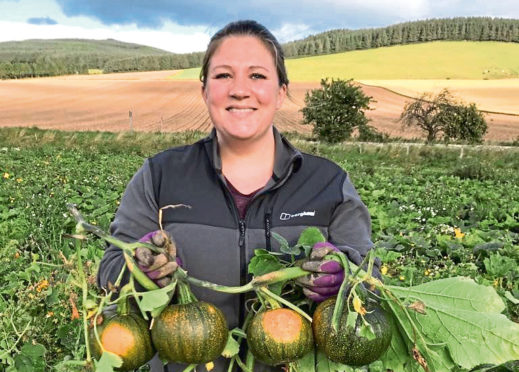A surge in the popularity of celebrating Halloween has delivered spin-off benefits for Scottish farmers.
Statistics from VisitScotland show that visitor numbers to sites featured on the tourism body’s Ghost Trail have dramatically increased.
In 1999, there were 2.2 million visits to 10 attractions featured on the trail and by 2018 that had jumped to 3.9m visits.
The celebrations have also seen a move away from the traditional turnip jack o’ lantern in favour of the more easily-carved pumpkin.
Scottish farmers who have diversified into pumpkin cultivation are capitalising on the trend.
In Aberdeenshire, Westerton Farmers are now in the third year of growing pumpkins, with six varieties grown across half an acre.
Westerton’s Fiona Smith said people “adore coming to the farm” for the pumpkin picking event, which also provides an opportunity for people of all ages to get out in the fresh air and see farm equipment, animals and other crops.
She said business at the farm shop – the Spud Hut at Cairnton Farm, near Laurencekirk – also improved, with increased visitor numbers on site.
Covid-19 restrictions have seen the event become ticket-only this year, with limited visitor numbers and at least 10 additional staff members brought in, together with sanitiser stations and a one-way system in place.
Mrs Smith said: “We fully intend to continue with our pumpkin events and growing the crop – we all enjoy the open weekend so much.
“As long as there is demand for them, we will keep growing them.”
In Fife, Cairnie fruit farm has been cultivating pumpkins for 21 years and allocates two acres for the crop, with an eye to increasing it to three.
The first year saw a crop of around 350, while the firm is expecting to grow around 12,000 pumpkins this year, with a diverse crop variety delivering a broad range of sizes, colours and price points.
John Laird, one of the farm’s owners, said the pumpkin venture had “exploded over the past few years” and had delivered a welcome shoulder season for the agritourism sector during the pandemic, while the crop also provided ingredients for the fresh products for the farm cafe.
He said: “Pumpkins deliver a decent return on investment, but they are difficult to grow here in Scotland and are planted by hand, before being brought on in tunnels.”
Mr Laird said half the crop was grown in tunnels to ensure good yields and while the company currently imports seeds from America, the business would welcome the development of a Scottish pumpkin variety.
